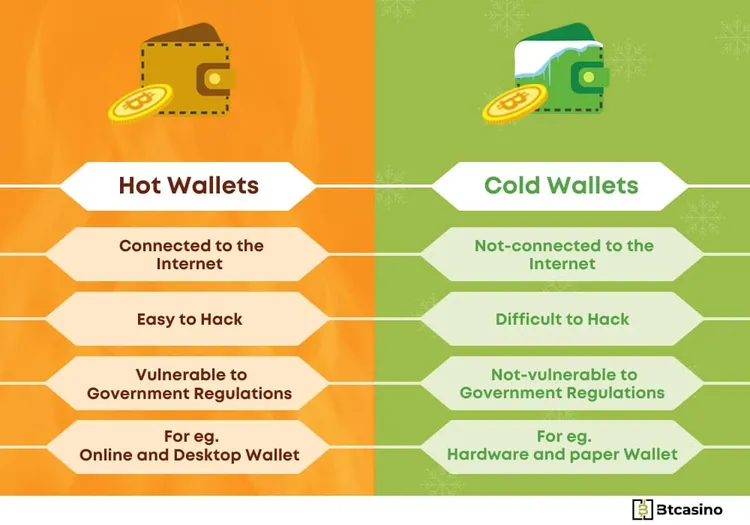Crypto Wallets 2025 - Types, Comparison, Security & Recommendations
Crypto wallets are the foundation for securely storing and flexibly using Bitcoin, Ethereum & other cryptocurrencies. But not all wallets are the same: depending on your intended use, security needs, and personal habits, different wallet types may be better suited – from highly secure cold wallets to practical mobile wallets for everyday use.
In this guide, you'll get a complete overview: What types of crypto wallets exist? How do they differ in strengths and weaknesses? How can you set up your wallet securely? And which wallets do we currently recommend?
Table of Contents
- Types of Crypto Wallets
- Cold Wallets
- Hot Wallets
- Exchange Wallets
- Paper Wallets
- The Best Crypto Hardware Wallets 2025
- The Best Desktop Wallets 2025
- The Best Crypto Wallets for Android and iOS 2025
- The Best Exchange Wallets 2025
- What is a Seed Phrase?
- Custodial vs. Non-Custodial Wallets
- Security Tips for Crypto Wallets
- Conclusion: The Best Crypto Wallet Depends on Your Personal Requirements
- FAQ about the Best Crypto Wallets
- More Topics Around Crypto & Gambling:
Types of Crypto Wallets
Before choosing a wallet, it's important to understand the different types. In general, wallets fall into these categories:
- Cold Wallets
- Hot Wallets
- Exchange Wallets
- Paper Wallets
Cold, Exchange, and Paper wallets don't require further subcategories, but Hot Wallets do (desktop, mobile, web). Here's a quick comparison:
| Criteria | Cold Wallets | Hot Wallets | Exchange Wallets | Paper Wallets |
|---|---|---|---|---|
| User-Friendliness | Low | High | Very High | Very Low |
| Required Tech Skills | High | Moderate | Low | Moderate |
| Internet Connection | Offline | Online | Online | Offline |
| Long-term Storage | Suitable | Not Suitable | Not Suitable | Suitable |
| Costs (Acquisition) | Costs | Mostly Free | Mostly Free | Free |
| Privacy | High | Moderate | Low | High |
| Security | Very High | Moderate | Moderate | High |
| Daily Use | Not Suitable | Suitable | Suitable | Not Suitable |

Cold Wallets
Cold wallets (e.g., Ledger, Trezor) are offline devices that protect your coins from cyberattacks. They are the most secure option for long-term storage of large amounts.
Important: Always store your seed phrase offline and securely — it's the only way to recover your wallet!
Hot Wallets
Hot wallets are always online and therefore more vulnerable to attacks, but they offer maximum flexibility and fast access. Perfect for active traders and daily transactions.
Usually available for free as multi-wallets (e.g. Coinbase Wallet, Exodus, MetaMask, Trust Wallet).
Desktop Wallets
Software wallets for your PC or laptop. Considered more secure than typical hot wallets since they can be used mostly offline.
Great for users who want to manage coins from their desktop.
Popular options: Armory, Electrum, Exodus.
Mobile Wallets
Apps for smartphones or tablets – ideal for on-the-go. Enable fast transactions and QR code scanning.
Due to constant online connection, less secure than cold wallets.
Top apps: MetaMask, Trust Wallet.
Web Wallets
Run in your browser and can be accessed from any device. Login with username + password, often with 2FA.
Convenient but dependent on third-party providers — only use reputable services like Guarda.
Crypto Wallets for Online Casino Deposits:
Many wallets are great for fast & secure deposits at crypto casinos.
→ Learn more about crypto payments in online casinos and the best providers!
Exchange Wallets
Exchange wallets offer the most convenience - they're integrated into crypto exchanges like Binance, Bitpanda, or KuCoin and provide full trading features.
But: You don't hold your private keys (“not your keys, not your coins”).
That means: If the exchange is hacked or faces issues, you could lose your coins.
→ Not recommended for long-term storage.
Want to buy, trade, and manage your crypto all in one place?
Check out our crypto exchange comparison and find the best platforms for Bitcoin, Ethereum & more!
Paper Wallets
Paper wallets are a simple form of cold storage:
You write down your private key and wallet address on paper and store it offline.
Pros: 100% offline.
Cons: Paper can easily be damaged or lost — rarely recommended today.
The Best Crypto Hardware Wallets 2025
| Criteria | Blockstream Jade | Ellipal Titan | Ledger Nano X | Trezor Model T | Trezor Model One | SafePal S1 |
|---|---|---|---|---|---|---|
| Battery-Powered | No | Yes | No | No | No | Yes |
| Display | Yes | Yes | Yes | Yes | Yes | Yes |
| Compatibility | Linux, macOS, Windows | Android, macOS, Linux, Windows | Linux, macOS, Windows | Linux, macOS, Windows | Linux, macOS, Windows | Android, iOS, Windows |
| Price | Starting from 65 Euro | Starting from 170 Euro | Starting from 150 Euro | Starting from 215 Euro | From 65 Euro | Starting from 50 Euro |
| Touchscreen | No | Yes | No | Yes | No | Yes |
| Connectivity | USB, QR-Code | USB, QR-Code | Bluetooth, USB | Micro-USB, USB | USB, QR code | Bluetooth, USB, QR-Code |
| Supported Currencies | Bitcoin, Liquid Sidechain | More than 7,000 | More than 1,500 | More than 1,200 | More than 1.250 | More than 1,000 |
| Additional Features | Multisignature | Self-Destruct Mechanism | App Integration | Password Manager | Multisignature, Password manager | Crypto Exchange Integration |
The Best Desktop Wallets 2025
| Criteria | Armory | Atomic Wallet | Electrum | Exodus | MultiBit |
|---|---|---|---|---|---|
| User-Friendliness | Moderate | High | Moderate | High | High |
| Compatibility | Linux, macOS, Windows | Android, iOS, Linux, macOS, Windows | Linux, macOS, Windows | Android, iOS, Linux, macOS, Windows | Linux, macOS, Windows |
| Configurable | Yes | No | Yes | No | No |
| Crypto Exchange Integration | No | No | No | Yes | No |
| Mobile Version | No | Yes | No | Yes | No |
| Multisignature | Yes | No | Yes | No | No |
| Additional Features | Cold Storage | Staking | Lightning | Crypto Exchange Integration | - |
The Best Crypto Wallets for Android and iOS 2025
| Criteria | Coinbase Wallet | Exodus Wallet | Jaxx Liberty | MetaMask | Trust Wallet |
|---|---|---|---|---|---|
| User-Friendliness | High | High | High | Moderate | High |
| Decentralization | Moderate | Moderate | Low | High | High |
| In-App Purchases | Not possible | Possible | Possible | Not possible | Not possible |
| Crypto Exchange Integration | Yes | Yes | No | No | No |
| Multisignature | No | Yes | No | Yes | Yes |
| Smart Contracts | No | Yes | Yes | Yes | Yes |
The Best Exchange Wallets 2025
| Criteria | Binance | Bitpanda | Kraken | Kucoin | OKX |
|---|---|---|---|---|---|
| Futures | Yes | Yes | Yes | Yes | Yes |
| Live Chat Support | Yes | No | Yes | Yes | No |
| Margin Trading | Yes | Yes | Yes | Yes | Yes |
| Mobile App | Yes | Yes | Yes | Yes | Yes |
| User Count | Over 150 million | Over 4 million | Over 5 million | Over 29 million | Over 50 million |
| Founded Year | 2017 | 2014 | 2011 | 2017 | 2017 |
| Location | - | Vienna, Austria | San Francisco, USA | Mahe, Seychelles | Victoria, Seychelles |
| Staking | Yes | Yes | Yes | Yes | Yes |
| Supported Cryptocurrencies | More than 500 | More than 300 | More than 220 | More than 750 | More than 350 |
What is a Seed Phrase?
A seed phrase (12–24 words) is the most important security key for your wallet. It allows you to restore your wallet anytime, whether hardware or software.
Key rules:
- Never store your seed phrase online
- Keep it securely offline
- Never share it with anyone
If it falls into the wrong hands, your coins are gone — no matter how secure your wallet is.
Custodial vs. Non-Custodial Wallets
The difference is simple:
- Non-Custodial Wallets (e.g., hardware or many software wallets) — you hold your private keys and have full control.
- Custodial Wallets (e.g., wallets on exchanges) — the provider holds your coins & keys.
Non-Custodial = maximum security & true ownership.
Custodial = more convenient but riskier.
Security Tips for Crypto Wallets
To keep your crypto safe, follow these universal tips:
- Create backups
Never lose your seed phrase. Always create multiple offline backups. - Avoid phishing
Only download wallets from official sources and verify URLs. - Be cautious of social engineering
Never share sensitive info, even with seemingly trusted individuals. - Stay informed on legal changes
Crypto regulations can affect wallet security — keep up to date. - Use trusted sources only
Never download wallets from unknown or suspicious sites. - Check device security
Ensure your device is malware-free. For extra security, consider a clean OS install. - Test with small amounts first
Before transferring large sums, test the wallet with a small transaction. - Store your seed phrase securely
Again: this is the most important rule — your seed phrase is the master key to your wallet!
Conclusion: The Best Crypto Wallet Depends on Your Personal Requirements
There’s no one-size-fits-all solution. The best crypto wallet depends on your personal needs:
- For daily use → Hot Wallets or Exchange Wallets.
- For long-term storage → Cold Wallets (Hardware or Paper).
For maximum flexibility, it’s smart to use a combination of wallets for different purposes. That way, you’re always on the safe side.
FAQ about the Best Crypto Wallets
It depends on your needs. For long-term storage, we recommend a hardware wallet like the Ledger Nano X. For active trading, hot or exchange wallets can be more convenient. Many users combine several wallet types.
Use a hardware wallet for security, store your seed phrase offline, and never share it. Keep your devices clean and updated.
You don’t hold the private keys. If the exchange is hacked or collapses, you could lose your coins. Use exchange wallets only for short-term purposes.
Setup depends on wallet type & brand. Follow the official setup guide — hardware wallets usually come with detailed instructions.
More Topics Around Crypto & Gambling:
- Best Crypto Casinos
- Sports Betting with Cryptocurrencies
- Crypto Providers – Bookmakers, Casinos & Exchanges







